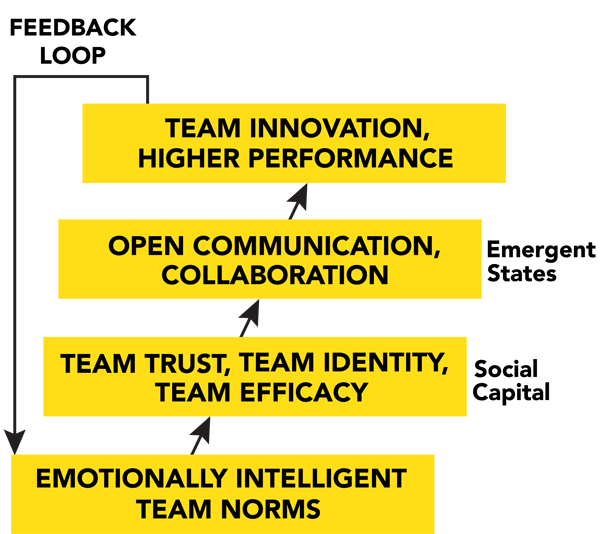
Empowering Teams With Team Emotional Intelligence
In today's environment, the team and not the individual, holds the key to business success. If you aspire to increase team effectiveness in this virtual world, then team emotional intelligence is your differentiator.
What distinguishes top from average teams? We at Legacy Teams discovered that top teams develop emotionally intelligent team norms which over time become habits that guide how members interact, and which enable otherwise skilled teams to come together and gel as a team. These Team EI norms fall into three major categories:
-
How We Treat One Another. We as human beings have specific emotional needs that emerge whenever we enter a social system such as a team. For example, we each have an emotional need to belong; to feel cared about; to feel that my ideas and contributions are valued, that the other members of this team have my back. These needs are predictable triggers of emotion. When they are satisfied, we can relax and focus on the task. When our needs are not satisfied, we feel anxious, we do not listen as well, we become selfish and hoard important information, we disengage and/or our relationships with other members becomes dysfunctional.
Much of the dysfunctional behavior on teams is the result of unfulfilled emotional and social needs that harken back to our membership and survival in a tribe. In fact, evolution has favored people who can think about emotions, feel emotions and use that information for the benefit of the tribe. The way you treat me, sends me information. Conversely, the way I treat you sends you information. So, we found that the best teams invest time getting to know one another – i.e., one's personal and family background, communication style, social style, interests, values. They also develop agreements for how they will provide feedback to one another – both care and concern, and feedback that addresses unacceptable behavior when it pops up.
-
How We Learn and Operate as a Team. This second category of norms is about how we leverage the full potential and brainpower of the team. The best teams do not want to hear from one or two people. They want to hear from everyone. They want members to think and work collaboratively. We found that the best teams periodically assess and identify actions to improve how they operate. They also create a team climate that supports the open expression of ideas and information. Further, they foster an optimistic and can-do attitude… a sense of efficacy among members that we can overcome any problem or obstacle and solve problems proactively vs. waiting until there's a crisis brewing.
-
How We Engage Our Stakeholders. This third category reflects the fact that no team is an island. Teams have senior leaders and functional leaders to whom they report. They have customers, suppliers and other teams with whom they work. These stakeholders have emotional needs and interests that need to be addressed and satisfied. So, the best teams, we discovered, pay careful attention to their key stakeholders.
We found that the best teams not only work hard to build these critical team norms, but they also work diligently to enforce this statement of intent to which they agreed. For example, one team leader with whom we spoke talked about his rule of no multi-tasking during his conference call meetings. When we interviewed his team members, they confirmed that when they attend his meetings there was no multi-tasking. When we asked him what he or other members did when a member was seen multi-tasking – looking at their phone or texting, he stated that this simply did not occur. His team members concurred. This was normal behavior for this team, and they didn't deviate from this agreed upon team norm.
We also found that average teams do not invest much if any time intentionally building or enforcing emotionally intelligent team norms. As a result, members hold back information; they disengage; they avoid difficult and constructive conversations; and they do not demonstrate enough of the pro-social actions and team behaviors that are necessary prerequisites for innovation and high team performance.
We at Legacy Teams have spent over 20 years studying the influence of emotionally intelligent team norms. Our research, as well as the research of others, has found that these basic tenets are the foundation for building a true high performing team. The model below illustrates how these norms impact a team's climate and performance.

Legacy Teams can help your teams assess and build their Team Emotional Intelligence. It is a new year and it might just be the right time to tune up your team(s) for peak performance in 2021. Contact us to find out more about our team emotional intelligence assessments and consulting support.
Best wishes for a happy and prosperous new year!